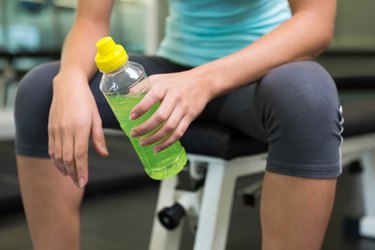
In those moments, when you need a boost, an energy drink is the go-to option. Luckily, there are sugar-free energy drinks available to you. There are the most popular energy drinks like sugar-free Monster and Red Bull or the lesser-known ones, such as VPX Bang.
Sugar-Free Monster
Video of the Day
If you're a fan of Monster Energy drinks, you should check out their sugar-free option. It has all the caffeine of the regular Monster without any of the sugar and fewer calories. So you can get the energy you need while watching your weight.
Video of the Day
When looking at the ingredients of the Monster Energy Zero Ultra, there's a lot that boosts energy. Caffeine is a well-known stimulant, noted in a study in the January 2017 issue of Neurotoxicity Research. It also contains B vitamins. According to a study in MDPI Nutrients February 2016 issue, B vitamins improve the brain's function as well as energy generation and synthesis.
But then there's the sucralose. According to an article published by the International Journal of Health Science and Research in April 2015, sucralose raises blood glucose. It can also, in too-high doses, lead to nausea, vomiting and diarrhea.
Sugar-Free Red Bull
Similar to Monster's sugar-free version, Red Bull offers you all the energy without the setbacks of sugar.
It's filled with B vitamins and caffeine, which the Neurotoxicity Research and the MDPI studies showed increases energy. Making Red Bull stronger, it contains about 20 milligrams more of caffeine.
The problem is to make these energy drinks sweet they have to use artificial sweeteners. The International Journal of Health Science and Research study found associations between artificial sweeteners and obesity. Aspartame, specifically, has adverse side effects at high doses according to an April 2014 study in Research in Nursing & Health. It can cause mood swings, bouts of depression, impair spatial orientation and cause irritability.
Read more: The Ultimate Guide to Natural Sweeteners
VPX Bang Energy Drink
VPX is one of the better sugar-free energy drinks on the market. It contains caffeine, CoQ10 and other beneficial amino acids.
CoQ10 improves energy, according to a May 2016 study in Current Drug Metabolism. It helps the bioenergetics of cells. CoQ10 improves mitochondrial function, countering some of the effects of aging on energy.
MatchaBar Hustle Unsweetened Energy Drink
As the name implies, MatchaBar Hustle is made with matcha. It also contains 120 milligrams of caffeine. That's more caffeine than sugar-free Monster or Red Bull.
A May 2017 study in Food Research International found that low doses of matcha improve attention speed. Matcha enhances secondary memory as well. The energy drink also contains green tea. A study in Critical Reviews in Food Science and Nutrition's October 2016 issue found that green tea increases energy.
Hiball Sparkling Energy Water
If you love sparkling water and want a keto-approved energy drink, this might be the one for you.
Hiball has the caffeine found in most energy drinks and several other supplements. There's no sugar, but there are ginseng, guarana extract and B vitamins. As noted in the MDPI Nutrients study, B vitamins increase energy.
Ginseng has several benefits according to a study published in the December 2016 issue of the journal Nutrients. It improves mitochondrial function, thereby improving overall energy production and use.
A Warning on Caffeine
As you may have noticed, all of the sugar-free energy drinks contain a hefty dose of caffeine. And that's great for improving your energy, but you should be aware of the downsides.
A study in the October 2016 issue of Human Molecular Genetics found that caffeine impacts everyone differently. Your genes determine your sensitivity. So does your intake of caffeine; thus your tolerance increases with use.
The problem is that caffeine is only safe for healthy adults in moderate doses according to an article published by Front Psychiatry in May 2017. It poses risks to young adults, adolescents, children and people who are pregnant, breastfeeding or have heart issues. It also can impair iron absorption, which is why moderation is key.
- Red Bull: "Red Bull Sugarfree Ingredients"
- Research in Nursing & Health: "Neurobehavioral Effects of Aspartame Consumption"
- International Journal of Health Science and Research: "Sweeteners in Human Nutrition"
- MDPI Nutrients: "B Vitamins and the Brain: Mechanisms, Dose and Efficacy—A Review"
- Front Psychiatry: "The Safety of Ingested Caffeine: A Comprehensive Review"
- Neurotoxicity Research: "Caffeine Induces a Stimulant Effect and Increases Dopamine Release in the Nucleus Accumbens Shell Through the Pulmonary Inhalation Route of Administration in Rats"
- Human Molecular Genetics: "Genome-Wide Association Study of Caffeine Metabolites Provides New Insights to Caffeine Metabolism and Dietary Caffeine-Consumption Behavior"
- Food Research International: "An Intervention Study on the Effect of Matcha Tea, in Drink and Snack Bar Formats, on Mood and Cognitive Performance"
- Critical Reviews in Food Science and Nutrition: "A Minireview of Effects of Green Tea on Energy Expenditure"
- Nutrients: "Anti-Fatigue Effects of Small Molecule Oligopeptides Isolated from Panax Ginseng C. A. Meyer in Mice"
- Current Drug Metabolism: "Coenzyme Q10 Supplementation and Exercise in Healthy Humans: A Systematic Review"
- Matchbar: "Hustle Original"
- USDA: "USDA Branded Food Products Database"
- Bang: "Bang 12 Pack"
- USDA: "USDA Branded Food Products Database: Hiball Energy, Sparkling Energy Water"